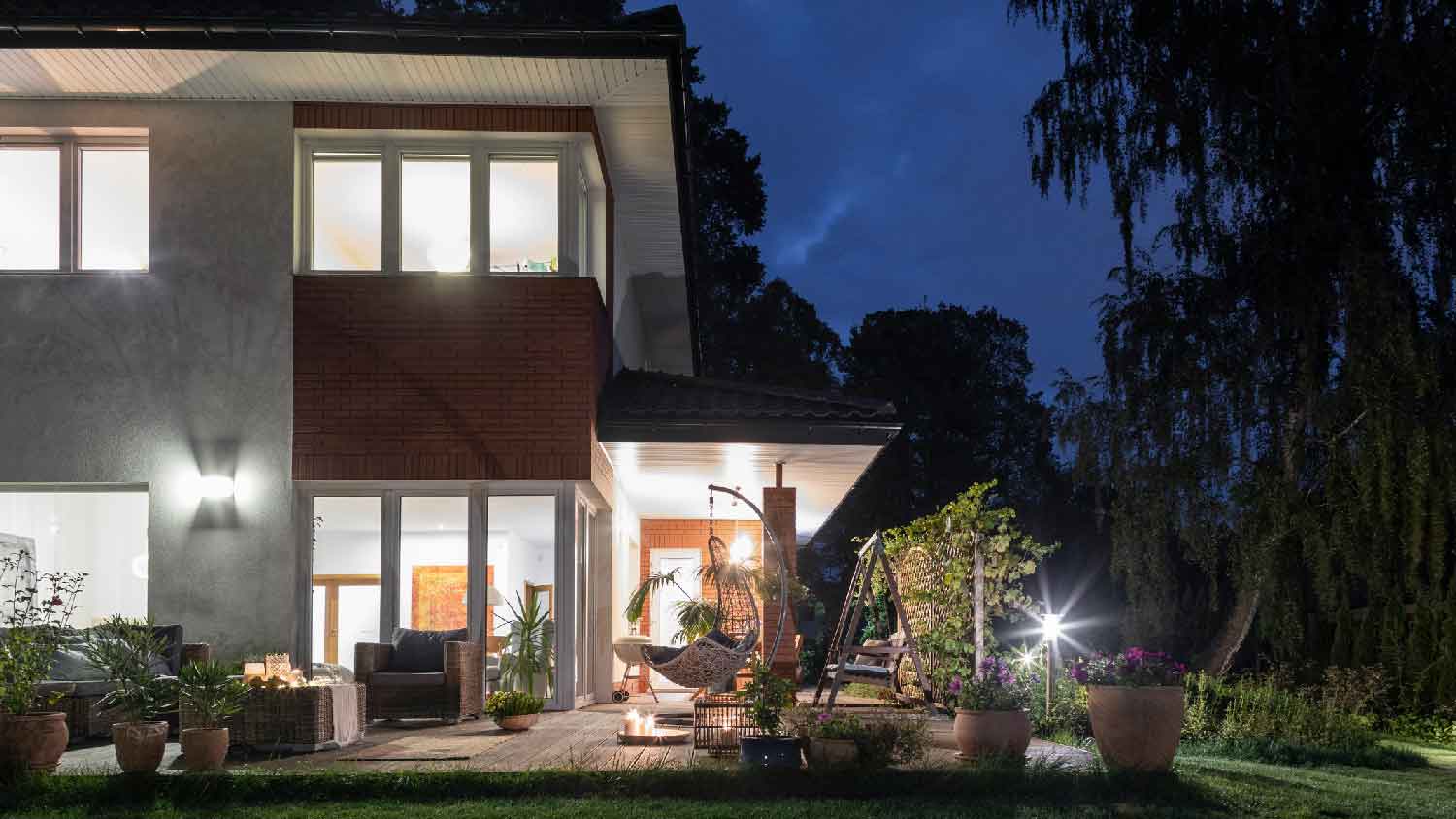
Discover the cost to install landscape lighting. Learn about average prices, key cost factors, and ways to save on your outdoor lighting project.
Let your outdoor space shine with the help of the right expert


Always check references, qualifications, and experience.
Find out if the pro has the proper licenses and insurance.
Get a written contract with details of warranties and cost breakdowns.
When you’re giving your outdoor landscape a major overhaul, it’s easy to overlook the importance of good lighting. The right yard illumination enhances the overall design aesthetic of your outdoor space and will impress your alfresco dining guests. It also makes your garden more safe and secure—no more late-night tripping over planters or worrying about potential burglars lurking in dark corners.
If you’re opting for more than just a wallet-friendly, basic outdoor lighting option, like string bulbs or fairy lights, it might be worth hiring a landscape lighting company. A good pro looks at the natural lighting your yard receives and how to place the right kind of artificial lighting to maximize ambiance and practicality.
Asking landscape lighting designers the following questions when considering an outdoor lighting project will help you secure the right person for the job.
While it’s a good idea to check out online reviews and do a little initial research yourself, always ask the lighting designer directly about their experience, qualifications, and references. Check out portfolio examples of their work and speak to past customers.
Also, investigate if they have any landscaping qualifications, whether they’re members of any organizations, like the Association of Outdoor Lighting Professionals, and what seminars, workshops, or courses in their field they’ve attended.
Costs vary considerably depending on the size of the project, type of lighting, and level of support the lighting designer provides. According to HomeAdvisor, the average cost to install outdoor lighting is between $2,000 and $4,500. Getting multiple quotes and requesting a breakdown of the costs helps you understand if they’re charging a fair rate.
If the designer installs the lighting, they will probably need a license. Most states legally require professionals that service or install low-voltage lighting systems to have this. A good lighting contractor will be happy to show you their license number, along with liability insurance and bonds paperwork.

Any outdoor lighting contractor worth their salt will provide a formal written agreement. This legally binding, signed contract lets you see clearly what is being proposed and offers security and peace of mind. A decent contract will describe the scope of the work, the materials being used, a cost breakdown, and timescales.
If the outdoor lighting contractor doesn’t provide at least one year's warranty for their work, you might want to look elsewhere. Some reputable companies even offer 10 year or lifetime warranties. Warranties for individual lighting components vary depending on the manufacturers, but a good contractor will explain all of this to you.
Professional outdoor lighting designers usually work hand in hand with general landscaping contractors on big remodeling projects. Finding a professional with specialized experience in this area rather than a general landscaper or electrician is best.
They’ll really know how to maximize the lighting potential and what the best types of lighting for your situation are and where to source them.
If the contractor doesn’t take the time to understand your needs and preferences relating to the outdoor lighting installation, you could end up with something that doesn’t work for you. They should be keen to ask you questions about what you have in mind and be ready to offer alternative suggestions, with justification for why their idea might work better.
A good pro won’t try to upsell something you don’t need. There are plenty of inexpensive, simple options, like basic outdoor solar lights or lanterns, that you can install yourself with a bit of DIY knowledge.
However, for more complex installations, without the help of a pro, you could end up dealing with more landscaping lighting issues further down the line. Projects requiring extensive electrical wiring and trench excavation are always best done by the pros. Sometimes, you might have to call them in because of licensing laws.
A reputable contractor will break down the advantages of hiring them for bigger projects. Some of these include:
Safe electrical installation
Ability to work alongside general landscapers and other contractors
In-depth knowledge and understanding of the right type of lighting for your space and needs
Access to specialized products and discounts
From average costs to expert advice, get all the answers you need to get your job done.

Discover the cost to install landscape lighting. Learn about average prices, key cost factors, and ways to save on your outdoor lighting project.

How do you choose between the many types of outdoor lighting when planning for your space? Learn about each kind in this quick outdoor light guide.

If there's one thing your outdoor parties and barbecues need, it's a bit of light. These outdoor lighting questions will help you light up the night.

Get transparent landscape lighting repair cost info. Learn what impacts price, compare repair vs. replacement, and find ways to save on your project.